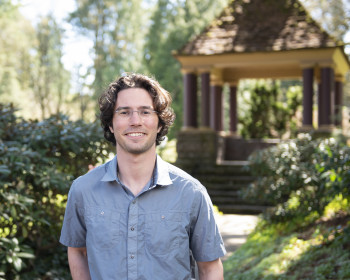Lewis & Clark Students Vote at Much Higher Rates Than the National Average
A recent study by Tufts University’s Tisch College of Civic Life found that Lewis & Clark students voted at a much higher rate than the national average for the 2018 midterm elections. Opportunities for civic engagement on campus could factor into the increase.
by Yancee Gordon BA ’21
For the 2018 midterm elections, Lewis & Clark’s voting rate was 21.3 percent higher than the national average according to the National Study of Learning, Voting, and Engagement (NSLVE). This study was conducted by the Institute for Democracy & Higher Education (IDHE) at Tufts University’s Tisch College of Civic Life. The goal of this organization is to track voting habits and civic engagement in various colleges and universities across the nation.
On average, the voting rates at participating college campuses doubled in 2018 compared to the previous 2014 midterm election. In 2018, the average institutional voting rate among campuses in the study was 39.1 percent, nearly 20 percentage points higher than 2014’s average turnout rate of 19.7 percent. Lewis & Clark in particular increased voter turnout from 37.1 percent in 2014 to 60.4 percent in 2018.
“The voting rates we reported in our inaugural 2014 reports were surprisingly low,” said Dave Brinker, senior researcher for IDHE. “Higher education is intended to promote social mobility. We found that the low voting turnout inspired and empowered students and administrators to take renewed interest in student civic learning and political participation.”
Students can get involved in a variety of ways at Lewis & Clark. One of the most popular methods is taking courses that offer direct engagement with the Portland community. Associate Professor of History Reiko Hillyer teaches a course called Crime and Punishment, where students gain an understanding of the history of mass incarceration, interrogate its seeming inevitability, and develop compassion for those whom it affects most directly. Students learn and work with incarcerated people as peers; the most recent iteration of the course culminated in an interdisciplinary theatrical performance exploring the system of mass incarceration.
“Lewis & Clark is proud to produce smart, engaged, critical thinkers and voters,” President Wim Wiewel said. “The biggest issues we face can only be solved through greater collaboration and unflinching engagement in our democracy.”
Another example of finding civic engagement through curriculum is Argumentation and Social Justice, a course taught by Associate Professor of Rhetoric and Media Studies Mitch Reyes. Students study various aspects of argumentation and social justice, and apply their scholarship working with students from local public schools.
“We seek to be a hub for civic engagement through service-learning and community engagement, and I get to see students involved in civic and social change work on the regular,” Director of Student Life and Leadership Harold McNaron said. “I’m proud of the ways our students, staff, faculty, and alumni engage civically and for social justice.”
More Newsroom Stories
Public Relations is located in McAfee on the Undergraduate Campus.
MSC: 19
email public@lclark.edu
voice 503-768-7970
Public Relations
Lewis & Clark
615 S. Palatine Hill Road MSC 19
Portland OR 97219

